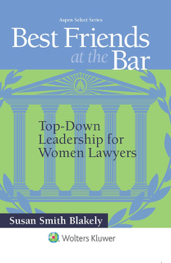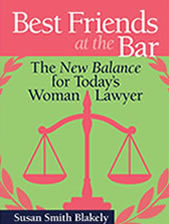Practicing law — particularly for women with family care taking responsibilities — has always been challenging. I have personal experience with practicing law while raising children and also caring for the needs of an aging parent, and it can be exhausting.
And now the pandemic has put another weighty layer on these challenges. How all lawyers, men and women alike, deal with this will define them in ways that are likely to create career paths they might not have anticipated prior to the pandemic.
The weighty responsibilities of virtual practice, including the need to carve out private spaces to return client phone calls and participate in Zoom sessions, and the responsibilities of home schooling to support virtual learning cannot, it seems, fail to be a constant reminder that our profession is designed for 24/7 delivery of services and for people without other pressing commitments. Fax machines, Blackberries and then iphones started it all, and now availability all the time has become an accepted aspect of practice.
The costs of this kind of availability should be of concern to all of us. Although these costs traditionally have been a subject of discussion between colleagues around proverbial water coolers, these realities are now presenting themselves as particularly poignant and are teeing up a recognition of the importance of addressing the workaholic aspect of our profession and coming up with realistic solutions.
Of particular importance to me is the tension between the need for diversity in the legal profession, which promotes the retention and advancement of women lawyers, and what is sometimes considered to be a related reduction of profitability. In other words, Susan at the office and Susan at home, responding to the needs of family, often are perceived to be in conflict.
In the past, it was easier to separate Susan at the office from Susan at home. But, now, while Susan is in isolation at home, she now lives in her office. She could easily view herself as under a microscope with the requirement to be perfect at being both a lawyer and a mother and, for some, a perfect daughter caring for elder parents under that same roof.
It takes a strong woman lawyer to keep from doubting herself and experiencing a diminution of self worth under these circumstances. And that is a slippery slope.
How do we prevent that? How do we bring greater humanization to the practice of law to avoid such destructive ends? In response, I could address, yet again, the kinds of professional behavior that I would like to see promoted in impersonal Big Law practices, especially, around the country. But I want to think bigger here.
I want us to contemplate the very essence of current professional practices and demands of law firms and what the pandemic has taught us. For example, we have learned that we do not have to be present in professional offices for twelve to fifteen hours a day to deliver excellent legal services.
We have learned that hearing the voices of children in the background during a business call is a mere recognition of the reality that lawyers need to be present in the lives of their children. We have learned that looking at a computer-driven device 24/7 is not good for our mental health.
We have learned that receiving e-mails in the wee hours of the night are very disruptive, and we try not to do it to others. We even have learned that seeing the smiles on the faces of those we love on a more regular and consistent basis makes our hearts sing.
The pandemic has underscored these issues, but it did not cause them. The duality and resulting tension that we are experiencing during COVID-19 is, in reality, nothing more than an extension of age-old habits, and the real culprit is the manner in which we have allowed our profession to run roughshod over our personal lives.
There is a reason why people, even lawyers, in other cultures are encouraged to demonstrate greater respect for their family lives and to take month-long vacations to enrich family experiences. It is something we need to think about as we pull out of the pandemic in the coming year and return to practice as usual — OR NOT. I am hoping for NOT.
As we contemplate the financial benefits of working remotely related to the questionable need for expensive brick and mortar practices, let us also contemplate the well-being issues that have become more clear to all of us during isolation during a pandemic.
We owe that to ourselves, to our families, and to the future of our profession.













